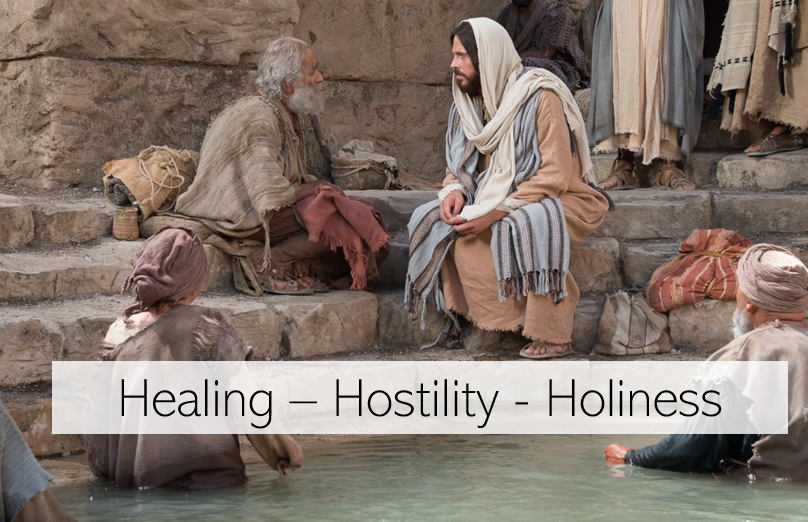This story is one of the miracles of Jesus. We’re going to look at it in three sections: healing, hostility, and holiness.
Jesus Heals a Man at the Pool (John 5:1-15)
5 Some time later, Jesus went up to Jerusalem for one of the Jewish feasts. 2 In Jerusalem near the Sheep Gate is a pool. In the Aramaic language it is called Bethesda. It is surrounded by five rows of columns with a roof over them. 3-4 Here a great number of disabled people used to lie down. Among them were those who were blind, those who could not walk, and those who could hardly move. 5 One person was there who had not been able to walk for 38 years. 6 Jesus saw him lying there. He knew that the man had been in that condition for a long time. So he asked him, “Do you want to get well?”
7 “Sir,” the disabled man replied, “I have no one to help me into the pool when an angel stirs up the water. I try to get in, but someone else always goes down ahead of me.”
8 Then Jesus said to him, “Get up! Pick up your mat and walk.” 9 The man was healed right away. He picked up his mat and walked.
This happened on a Sabbath day. 10 So the Jewish leaders said to the man who had been healed, “It is the Sabbath day. The law does not allow you to carry your mat.”
11 But he replied, “The one who made me well said to me, ‘Pick up your mat and walk.’ ”
12 They asked him, “Who is this fellow? Who told you to pick it up and walk?”
13 The one who was healed had no idea who it was. Jesus had slipped away into the crowd that was there.
1. Healing
Jesus has come to Jerusalem for a Jewish religious festival.
John doesn’t tell us about the festival. Instead he focuses on the Sheep Gate and the Pool of Bethesda. There are many people with physical disabilities here.
In the middle of a huge religious festival, Jesus goes to a place of great human need.
He notices one man and heals him. Why doesn’t he heal them all at this time? We don’t know. What we do know is that he cares about people in particular: like the man in the story, like you, and like me.
He asks the paralysed man what
seems to be a strange question: “Do you want to get well?”
It’s not actually such a strange question.
- The man might not have wanted to get well!
Illness can become part of our identity, so the thought of getting well can be frightening.
- The man doesn’t give a direct answer, but he does reveal another need: loneliness.
Jesus has started healing already by being with him and understanding his heart.
Jesus gives the man a command: “Get up! Pick up your mat and walk.” Jesus physically heals him, and he activates faith at the same time. Jesus brings the will of the man into partnership with God’s purpose through faith in him.
There are many dimensions of
healing here. Physical healing, social and emotional healing, spiritual
healing.
Question: What do you want God
to do for you?
2. Hostility
We usually see what we’re looking for. And we usually don’t see what we’re not looking for.
In this story, the Jewish leaders were looking for people breaking the Sabbath. But focusing on the law meant that they missed the work of Jesus among them. They didn’t see it.
We also do this. We can get so
busy looking for all sort of things (like success in our lives, or certain
behaviours, or worship styles, or what people think of us) that we miss the
work of Jesus in us and among us.
Question: What stops us seeing
the work of God in us and among us?
3. Holiness
Jesus had slipped into the crowd after he healed the man. He probably wanted to keep it quiet because he knew that the Jewish leaders would be hostile to him healing on the Sabbath.
But then he went back and found him again. Why did he take that risk? Because the healing wasn’t done.
Jesus is the Lamb of God who takes away the sin of the world (John 1). He comes to heal us from sin and reconcile us to God.
Our deepest need is to be healed from sin and reconciled to God. And ultimately, Jesus was willing to give up his life to do that for us.
He is still the Healer. He is
still the Saviour.
